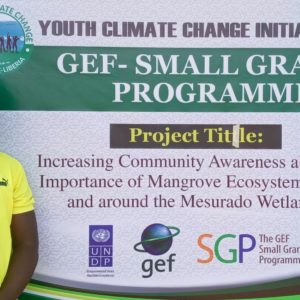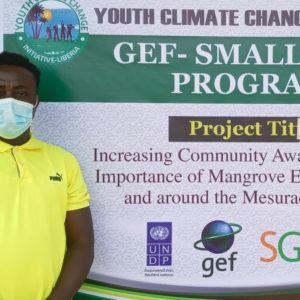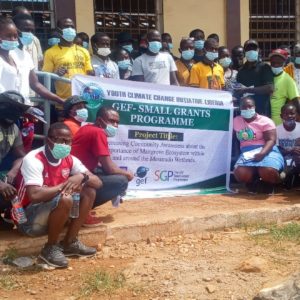By Wremongar Blojay Joe II
Located at the back of the massive inter-ministerial complex, in Congo town, Peace Island- a beautiful settlement has in the last decade seen its population surge to unbelievable levels.
Once a reserved government land, it is believed to have been occupied by mostly northerners who may have come to Monrovia fleeing conflict and violence resulting from the years of war.
But the beauty of the uphill island- the lining of mangrove swamp was come under threat of destruction as over population and lack of sustainable livelihood for dwellers has resulted to visible destruction of the natural environment in a next-door Monrovia settlement.
Unprecedented encroachments, colossal waste dumps, and in some cases enormous cutting of mangrove trees for fish drying, can be seen with just a walk around what could be a beautify site for tourism.
The EPA says it is doing all to stop the destruction of mangrove here, but its efforts could be too small to curb what a pro- environment youth movement describes as “fast destruction of nature” right before the eyes of authorities.
Youth Climate Change Initiative- (YCCI-Liberia) Liberia, a climate and environment non-for-profit Saturday moved into Peace Island with a team of environment and climate professionals for a dialogue on the need to preserve mangrove swamps.


PHOTO: YCCI-Liberia Executive Director Edwin Menscole at Peace Island Dialogue on Saturday April 4, 2020
They warned of the level at which the mangrove ecosystem in the “Mesurado Wetlands” is being destroyed, a satiation they say threatens the ecological integrity of the settlement.
Arthur R.M Becker, YCCI-Liberia Project Consultant in a presentation said Liberia’s five wetlands have in recent years come under serious threat, especially “encroachment by individual”.
“This is a major threat” said Becker.
He explained that encroachment and cutting down of mangrove trees do not only result to “biodiversity loss but also poses water purifications problems, and wetland degradation”.
Mr. He encouraged the dwellers of Peace Island to reject the purchase of wetlands and “report encroachment” of all forms.
“Don’t buy wetlands from anyone” he continued: “government has threatened to demolish all structures built on wetlands”, because acceding to him such construction either “threatens or compromises biological integrity” of these wetlands.
The destruction of the Mangrove swamps in the Mesurado Wetland Area cannot juts be blamed on those living at the margin of society but also township Commissioners often involved with the selling of wetlands and giving individuals squatter’s rights, even though these buyers have no documentation to show for the most part.
The National Coordinator of Liberia’s Nationally Determined Contribution to the Paris Climate Accord, John Kannah made a special presentation on “Using Valuation to Understand Public Perceptions of Mangrove Forests Benefits in Liberia”, an outcome from a 2018 study which was done in Grand Cape Mount County.
Mr. Kannah said the result of the study shows low climate education in Liberia and lack of basic understanding about underlying environment issues. He unveiled that people are willing to pay for the preservation of mangroves swamps but this must begin with individuals at community levels.
Kannah said once destroyed, it is almost impossible to bring back a mangrove swamp.
Teddy Taylor, the EPA’s National Focal Point for Action for Climate Empowerment (ACE) for his part observed wanton misuse of mangrove swamps across the country.
Mr. Taylor, who is also Youth and Climate Change Coordinator at the EPA, stressed to initiate a “whole new trun around strategy) to preserve the environment for the next generation “taking into account, the current threat of global warming and climate change”.

Participants from select communities pose for group photo in front of the YMCA community center on Peace Island. Saturday, April 5, 2021
Mangroves swamps are an important part of environment. They store more carbon than terrestrial forests, help fight coral bleaching and climate change and most importantly, they contain 75% of commercial fish.
Liberia is a signatory to the Ramsar Convention on Wetlands, – “an intergovernmental treaty that provides the framework for national action and international cooperation for the conservation and wise use of wetlands and their resources”.
The convention entered into force in Liberia on 2 November 2003 with five sites designated as Wetlands of International Importance.
The five sites include the Marshall, Mesurado, Kpatawee, Gbedin and the Lake Piso Wetlands, totaling a surface area of 95,879 hectares.
Youth Climate Change Initiative Liberia Executive Director, Edwin Mendscole said the dialogue in Peace Island was the first of a three activities under a project with the UNDP’s GEF Small Grants Program with the objective of increasing awareness and education in communities involved with the destruction of mangrove ecosystem and to train participants on the best method to use in conserve mangrove swamps.
“As part of this project”, her said the group will be providing alternative livelihood support to those who use the swamps for livelihood.”
According to him, Youth Climate Change Initiative Liberia will also engage into the establishment of biodiversity clubs in high schools to help initiate environmentally friendly discussions at that level.
Participants at the workshop were drawn from wetland communities including, Peace Island, SKD Boulevard, New Matadi, Sinkor and communities along the battery Factory area.
Students of the University of Liberia were also in attendance.

